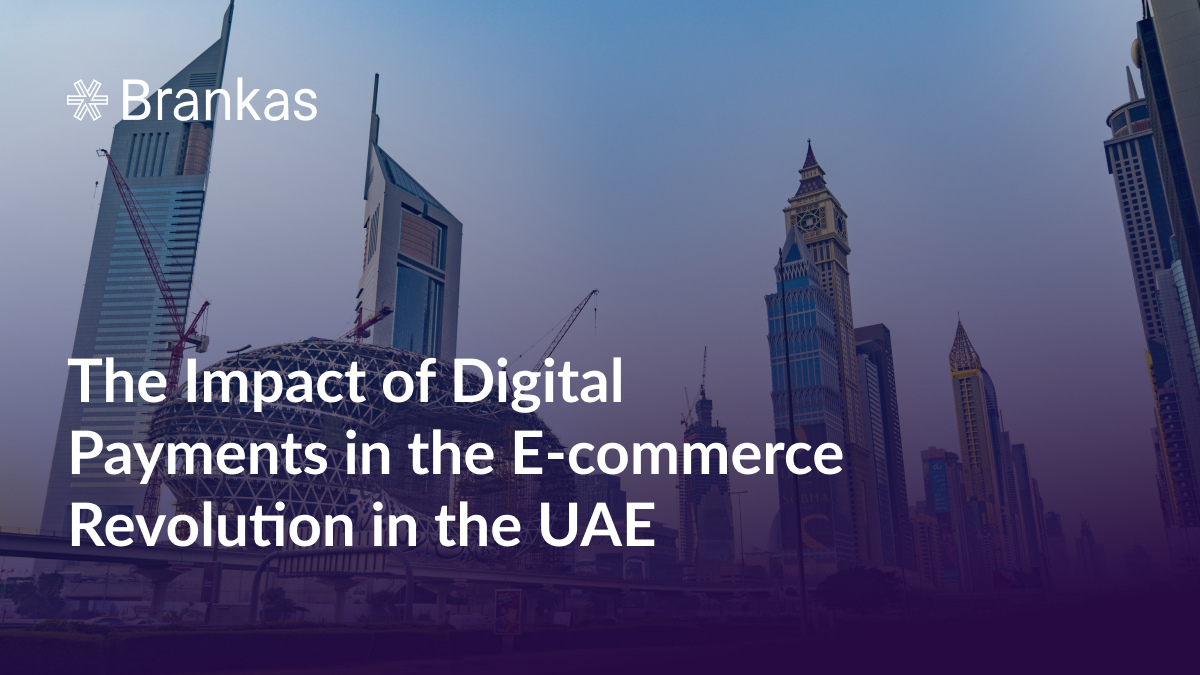The Impact of Digital Payments in the E-commerce Revolution in the UAE
As the standard customer behavior continues to change, the future of digital payments and e-commerce in the UAE holds immense potential. For businesses, digital payment systems help them offer a better customer experience, lower transaction costs, and broader reach.
Key takeaways:
- Small eCommerce businesses in the UAE often struggle to grow due to a lack of digital payment systems.
- The UAE retail eCommerce market reached a record of $3.9 billion in 2020, a 53% year-over-year increase.
- The market’s value is projected to surge to $8 billion by 2025
- Digital payment platforms have empowered 93% of small businesses in the UAE to focus on cross-border sales.
Amazon, the biggest e-commerce platform, got its first order paid back in 1995 all the way from Bulgaria through two folded $100 bills… fitted inside a floppy disk. Jeff Bezos’s story would not be as funny today for many e-commerce businesses if digital payments did not come through.
In the United Arab Emirates (UAE), digital, cashless transactions are becoming the norm as consumers and small and medium-sized enterprises (SMEs) increasingly adopt these solutions. However, small e-commerce businesses in the country still struggle to grow due to a lack of digital payment systems and foreign transaction fees.
Online payment processing services and integrated APIs are transforming the space as they handle these issues, making it easier for businesses to grow across borders. Hence, 93% of small businesses in the UAE are now focusing on expanding cross-border sales.
As e-commerce continues to expand, making cross-border payments can be critical for small businesses to reach customers and grow worldwide.
Digital Payment Solutions: Convenience for Customers, Expanded Opportunities for E-commerce Businesses
Mobile payments and digital wallets have made interacting with businesses and consumers in the UAE easier. The blend of technological developments and consumer-centric approaches has revved an era of accessibility, security, and inclusivity, creating a landscape of value-creating opportunities.
According to the Boston Consulting Group (BCG), the UAE’s digital payment sector is forecast to grow by 67% between 2020 and 2030 to reach $14 billion. During the same period, the number of transactions is expected to rise by 94% from approximately 644 million to over 1.2 billion.
A study by Visa reveals that UAE consumers are embracing cashless digital payment solutions every year more, with 52% planning to be cashless by 2024 or being cashless already. Mobile wallet apps, in particular, are used for more than just payments; they are becoming part of users’ daily lives.
For example, Dubai International Airport’s Smart UAEWallet service lets travelers use their phones for digital verification, so they don’t need to carry physical documents like passports and boarding passes. DubaiPay is another shared digital payment service that lets government entities and businesses offer around-the-clock payment options to their customers. It allows UAE citizens, residents, and visitors to make payments easily, conveniently, and securely using various available methods.
Among the criteria for selecting a wallet, security, and trust in the provider have solidified their status as table stakes, with 69% of respondents from a McKinsey survey saying these criteria are the most important. The next most commonly cited factors were ease of use and low cost.
For businesses, digital payment systems help them offer a better customer experience, lower their transaction costs, and widen their reach. Many small businesses that have started using digital payments have seen revenue increases.
According to a Dubai Chamber of Commerce and Industry study, the UAE retail e-commerce market reached a record of $3.9 billion in 2020, a 53% year-over-year increase. The market’s value is projected to surge to $8 billion by 2025, considering several key factors like high-income potential, high internet usage, a developed transport logistics network, and strong government support.
Digital payment APIs allow e-commerce businesses to deal with different currencies, manage international shipping, and offer various payment options that attract global customers. Such solutions also smooth business operations by automating payment processes and using real-time data to help small businesses set prices wisely and offer a convenient customer experience.
There are also challenges like international market trends and the regulatory landscapes businesses need to keep up with.
Digital Payments in E-commerce to Expand, Costs to Lower
As the standard customer behavior continues to change, the future of digital payments and e-commerce holds immense potential. Digital payments in e-commerce enable even the smallest businesses to offer a better consumer experience, helping them reach more customers and increase their revenue.
Adopting digital payment APIs is simple but transformative for e-commerce businesses. When working with the right payment API service provider, businesses can save up to 30% of transaction costs. It can also help them take full advantage of the e-commerce revolution, improve operations, and build customer trust worldwide.
E-commerce businesses in the UAE can improve their operations by integrating secure and user-friendly digital payment APIs. To cater to a diverse customer base, they should offer various payment options like credit cards, mobile wallet apps, and buy now pay later (BNPL). This builds trust, reduces cart abandonment, and streamlines financial management through automated processes.
At the same time, banks and financial institutions can help accelerate the adoption of these modern financial services by providing a suite of APIs that any third-party provider can securely use. Learn more about how your business can offer an embedded finance experience here.


